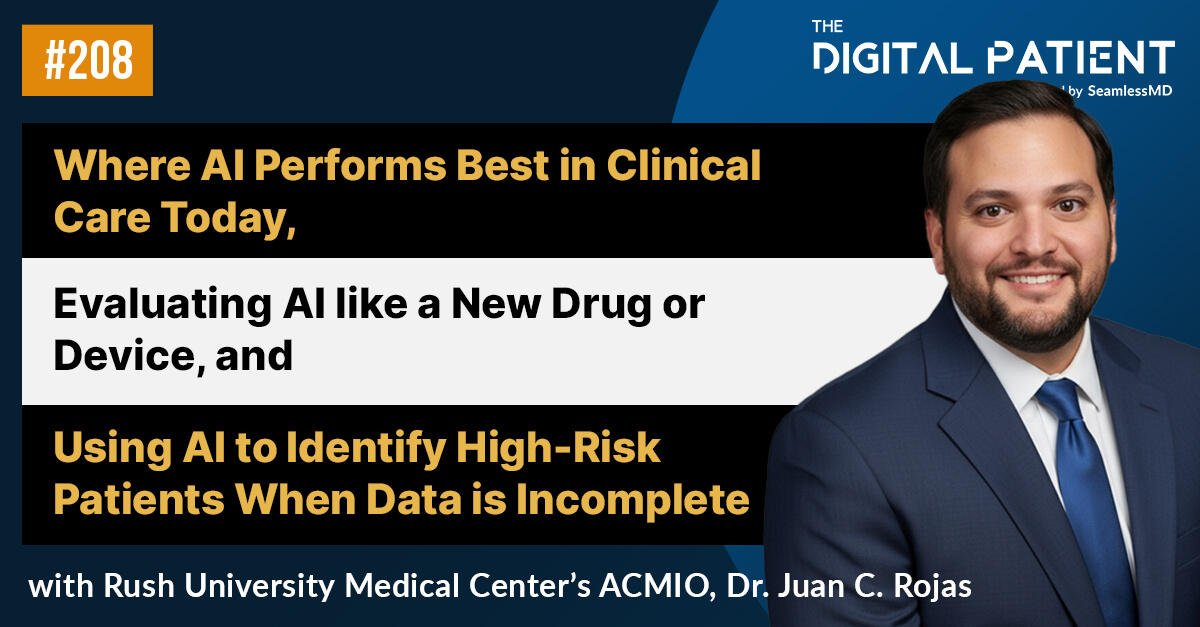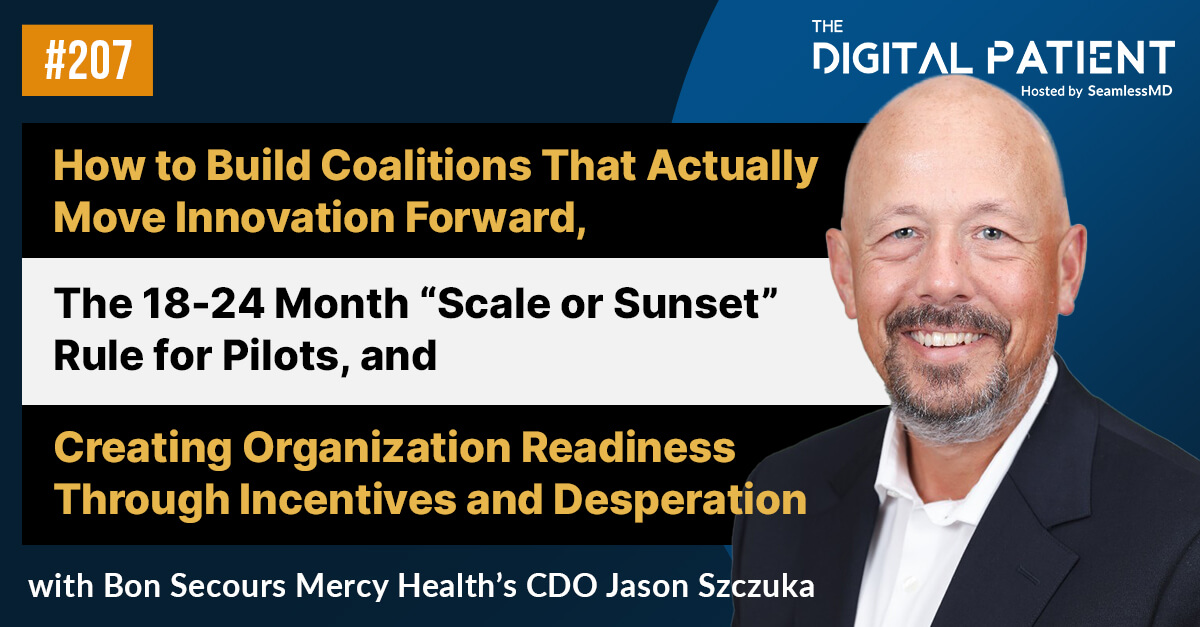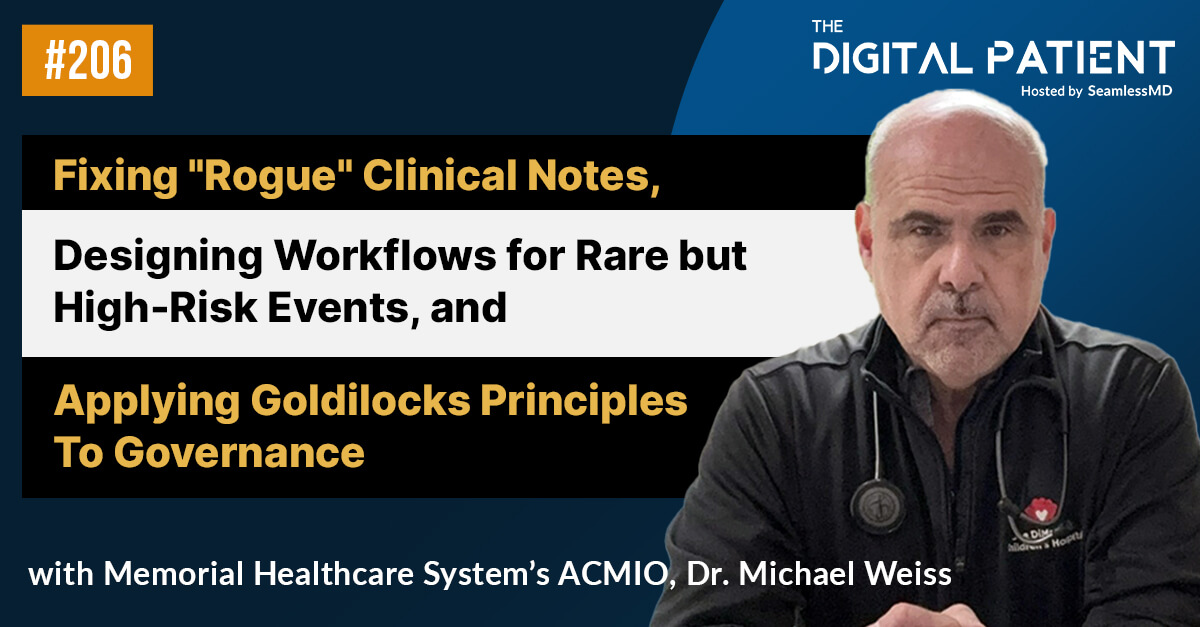Subscribe on: RSS | SPOTIFY | APPLE PODCAST | GOOGLE | BREAKER | ANCHOR
On this episode of The Digital Patient, Dr. Joshua Liu, Co-founder & CEO of SeamlessMD, and marketing colleague, Alan Sardana, chat with Dr. Christopher Longhurst, Chief Clinical and Innovation Officer, Associate Dean, and Executive Director of the Jacobs Center for Health Innovation at UC San Diego Health, about "Pioneering AI-generated patient message drafts, Why implementation will make or break your innovation, Bridging the gap between AI performance and outcomes, and more..." Click the play button to listen or read the show notes below.
Audio:
Video:
Guest(s):
- Dr. Christopher Longhurst (@CALonghurst), Chief Clinical and Innovation Officer, Associate Dean, and Executive Director for the Jacobs Center for Health Innovation at UC San Diego Health
- Dr. Joshua Liu (@joshuapliu), Co-founder & CEO at SeamlessMD
Episode 139 - Show Notes:
[00:00:52] Why Dr. Longhurst pursued medicine, influenced by his father's role as an academic physician and his own experiences in pediatric care;
[00:01:41] Transition into digital health and informatics, sparked by his growing up in the country, early exposure to computing, and a decision to blend medical training with computer science after his then Dean of Student Affairs mentioned he should talk with the informatics folks;
[00:03:19] Realistic applications and potential overestimations of AI in healthcare over the next decade;
[00:05:16] Dr. Longhurst's involvement in pioneering AI-generated patient message drafts in the EHR;
[00:06:01] Exploration and impact of AI tools like ambient documentation to improve clinical documentation processes and well-being;
[00:08:43] Challenges in quantifying the ROI of AI tools in healthcare, particularly when benefits include improved clinician well-being rather than direct productivity gains;
[00:10:27] Findings from Dr. Longhurst’s pilot study on AI-generated patient message drafts, revealing unexpected outcomes regarding time savings and cognitive load despite no time-savings for clinicians;
[00:15:43] Dr. Longhurst discusses the criteria for successful adoption of new clinical tools and the balance between technological innovation and practical healthcare delivery;
[00:19:06] Clinical equipoise and the importance of continuous improvement and comparative effectiveness studies in healthcare;
[00:24:23] Potential for reverse technology transfer, where innovations in low-resource, less regulated settings could inform practices in more developed healthcare systems;
[00:27:10] Concerns around the premature adoption of AI without sufficient studies on efficacy, emphasizing the need for implementation science centers to evaluate clinical effectiveness of AI models;
[00:29:25] The role of implementation science in realizing the true potential of AI (or other intervention) in healthcare, bridging the gap between algorithmic performance and outcomes;
[00:36:13] The importance of process and people in the successful implementation of technology in healthcare settings;
Fast 5 Lightning Round:
- Favorite Book: "Caring for Your Baby and Young Child: Birth to Age 5" by the American Academy of Pediatrics, a go-to gift for friends with new babies.
- Person to Meet: Abraham Lincoln.
- Preferred Superpower: Reading minds for professional settings and super strength or speed when retired.
- Belief in Healthcare: A single-payer system would reduce healthcare waste and improve population health, and how starting with universal coverage for children would be a great first step.
- Last Film Watched: "Hillbilly Elegy," directed by Ron Howard on Netflix. It was educational, great acting, but not outstanding overall.
.svg)










.png)
